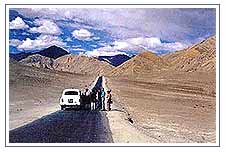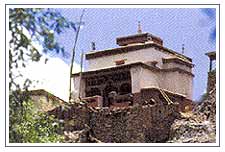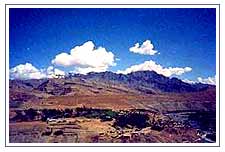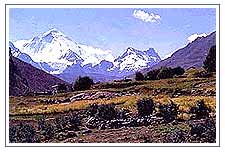The flight into
Leh,
the capital of Ladakh, is an unforgettable experience - over the dramatic
expanse of the Himalayas - for Ladakh straddles four main ranges - the great
Himalayan, Zanskar, Ladakh and the Karakoram. This is the highest inhabited
region in India and the River Indus with its tributaries, slice their way
through the ranges.
Remote though it is, Ladakh has never been totally isolated. Over the
centuries the trade route from India to central Asia passed through this
area undeterred by its high passes and desert landscape. Caravans carrying
spices, brocades, pearls, carpets and more mundane merchandise like salt and
tea took just two months to cover the distance from Amritsar in the Punjab
to the central Asian towns of Varkand and Khotan!
Leh and Kargil on this
ancient route developed then into centres of trade.
Journey To Ladakh Via Road
Travelling into Ladakh by road is exciting. It takes two days from Srinagar
to Leh with a mid way halt at Kargil, which gives the visitor a marvellous
introduction to this spectacular destination, while easing the
acclimatisation process to the high altitude low oxygen atmosphere of
Ladakh.
The road leaves behind the verdant beauty of the Kashmir valley at Zoji-la,
the pass in the Great Himalayan wall that is the gateway into Ladakh.
Densely forested slopes give way to bare mountains in shades of russets and
brown as the road descends to the alpine meadows of Minamarg on to Drass,
the first village after the pass. It is reputed to be the second coldest
habitation in the world after Siberia! The people here are different. They
are of Dard origin and believed to be an Aryan people who migrated from the
Central Asian steppes.
Onward the road traverses a narrowing gorge on to the little trading town
of Kargil, the mid point of the journey. Located on the river Suru, at 9,000
feet, Kargil is the base for visits to the spectacular Suru and
Zanskar
valleys and for a variety of adventure activities in the region. 40-km ahead
of Kargil is Mulbekh noted for its immense figure of Maitreya, the future
Buddha, carved in deep relief into a rock face high above the village.
The road climbs its breathless way to more passes Namika la and Fotu la a
truly top of the world feeling. It sweeps past the amazing Lamayuru
monastery spilling spectacularly over a mountain side down the incredible
Langroo loops to meet the river Indus at Khalatse - a descent of 4,000 ft.
/1,219 m in about 32-km. A panoramic view of the amazing russets, yellows
and greys of the Ladakh range unfolds as the road follows the river. Gompas
and forts can be glimpsed in the distance. At the Spituk monastery the
visitor gets a first dramatic glimpse of Leh, floating like a mirage in the
distance.
Buddhism & Monasteries In Ladakh
Though Leh has been capital of this region since the 17th century, strewn
around it along the Indus valley are earlier capitals of he region. From Leh
one can wander off on marvellous day expeditions to get a glimpse of some of
the treasures of Ladakh.

Not far from Leh, Shey is the oldest capital of Ladakh from where its
earliest Tibetan kings ruled. Perched on top of a huge rock are the royal
palace and temples adorned with brilliantly coloured murals and a 7.5 metre
gold statue of the Buddha. Basgo and Tingmosgang with their forts and
palaces were also capitals of Ladakh. Stok Palace across the river from Leh
is the home of the erstwhile royal family. The Palace Museum here has
collections of beautiful royal costumes and jewellery, exquisite Thangkas,
porcelain, jade, weapons and armour.
Within easy reach of Leh is the Spituk Monastery with its commanding view
of he indus. It has fine Thangkas and a collection of ancient masks. Thikse
Monastery one of the most impressive in the area is spectacularly located
and is noted for its beautiful murals. Hemis is of course the biggest gompa
in Ladakh and the best known for its magnificent summer festival that
celebrates the birth anniversary of Guru Padmasambhava. The largest thangka
in Ladakh is to be found here. It is unfolded only once every 12 years.
Other magnificent gompas located in the vicinity include the splendid
Lamayuru, Likir, Phyang, Rizdong, Stakna, Matho and Chemrey Gompas, all
easily accessible from Leh. Alchi no longer an active religious centre, is
among Ladakh's most beautiful monasteries. Over a thousand years old,
its wall paintings like those of Tabo in Spiti are reminiscent of the Ajanta
style of painting.
Around Leh in the upper Indus valley is the cultural heartland of Ladakh,
where the old capitals of the area are located and where many of the
splendid palaces and Gompas are also to be found.
The people of Ladakh are predominantly Buddhist and practise 'Mahayana'
Buddhism tempered with the old Bon animistic faith and Tantric Hinduism. It
was brought Buddhism to Tibet and Ladakh during his travels in the 7th
century AD. In the 11th century the Buddhist scholar Rinchen Tsangpo
established 108 monasteries in the region. The Gompas at Lamayuru and Alchi
are said to date from that time.
The living Buddhist heritage is manifest in the villages where 'Mani'
walls are engraved with the mantra ' Om Mani Padme Hum' and stones
are piled into commemorative mounds known as 'Chorten'. The Gompas
precariously perched on steep hillsides or rock faces seem an integral part
of the rugged landscape.
In Western Ladakh, in Drass, Kargil and the Suru valley where the Muslim
Shia faith prevails there are mosques and imposing Imambaras in the Islamic
style, surmounted with domes.
Kargil

The second largest town in Ladakh marks the mid point of the journey from
Srinagar to Leh. Kargil is also the take off point for excursions into the
Suru valley and the remote Zanskar Valley with their exciting opportunities
for mountaineering, camping, river rafting and trekking trails into Himachal
Pradesh, Jammu and the Indus valley.
Kargil was once at the cross roads of a network of trade routes that led to
kashmir, Baltistan, Afghanistan, Central Asia and Tibet and an air of
romance still lingers around its narrow cobbled streets and bazaars spilling
over with locally crafted curios. The town retains its conservative Balti
Shia Muslim culture and has two fine mosques built in the Turkish style.
Nestling in the Suru valley, Kargil is set amidst green, richly cultivated
hill sides. The two tributaries of the river suru the Drass and Wakha meet
there. There are pretty walks around the town breathtaking views of the
mountains. A day long excursion into the Suru valley goes past the
picturesque Imambara of Trespone.
Suru Valley
The Suru Valley one of the prettiest areas of Ladakh, runs for 140-km
beyond Kargil to the Penzi La pass, the point of entry into the Zanskar
valley. Its verdant hills are intensively cultivated. Enough snow and water
during the year sustain two crops annually. The valleys are especially
picturesque in spring when they are the Sankoo-Panikhar tract is
magnificent. The open valley adorned with undulating alpine meadows strewn
with wild flowers, groves of poplars and willows are set against the
majestic backdrop of the Himalayan peaks dusted with snow.

At Thangbu, a little village, the traveller gets a first glimpse of the
spectacular Nun - Kun massif. Panikhar 12-km beyond this is the base for
treks to Kashmir and Kishtwar. The road goes past the glaciers of the Nun -
Kun massif to descend to Rangdum set in wild and beautiful surroundings. It
is located at the furthest end of the suru valley before the Penzi La pass.
Set high on a central hillock the Rangdum gompa with a little stream forming
a moat around it, looks like an ancient fort protecting the valley.
Air:
Leh - Leh is the main airport for this area. Direct flights link it to
Delhi, Chandigarh, Srinagar and Jammu. Kargil, Suru and Zanskar valleys -
Srinagar and Leh airports are both convenient.
Road:
Leh - Srinagar-Leh road is the main route with an over night halt at
Kargil. The road is open between mid June and November. Ordinary and deluxe
buses of the J&K state road transport corporation regularly ply on this
route. Taxis can also be hired at Srinagar for this trip.
The Manali-Leh Highway - This is a spectacular journey with an over night
halt at tented camps at Sarchu or Pang. This journey can be undertaken by
the deluxe and ordinary bus services operated by the Himachal Pradesh
tourism, HP SRTC and the J&K SRTC or by jeep from either Manali or Leh.
Kargil - On the main highway between Srinagar and Leh. Suru and Zanskar
valleys - The road from Kargil into the Suru and Zanskar valleys is open
only between July and October. Regular bus services link Kargil to Padum in
Zanskar. Group wishing to go to Leh, Kargil or Padum can charter deluxe and
a class buses from the J&K SRTC at Srinagar
Travelling In Ladakh:
Travelling by regular bus services along the regular routes and on fixed
schedules is the best way of getting around the area. More comfortable and
convenient are the taxis which are available on a fixed point to point
tariff. For off the beaten track trips to the newly opened areas of Nubra,
Changthang and Dah- Hanu it is mandatory to use the services of a
registered/ recognized travel agency to make all the arrangements for the
trip-including transport and overnight stays. All details of bus schedules,
taxis, travel agencies can be had from the tourist offices.




 The second largest town in Ladakh marks the mid point of the journey from
Srinagar to Leh. Kargil is also the take off point for excursions into the
Suru valley and the remote Zanskar Valley with their exciting opportunities
for mountaineering, camping, river rafting and trekking trails into Himachal
Pradesh, Jammu and the Indus valley.
The second largest town in Ladakh marks the mid point of the journey from
Srinagar to Leh. Kargil is also the take off point for excursions into the
Suru valley and the remote Zanskar Valley with their exciting opportunities
for mountaineering, camping, river rafting and trekking trails into Himachal
Pradesh, Jammu and the Indus valley. 